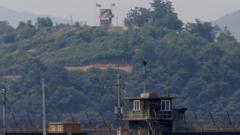The event, attended by hundreds of thousands, has ignited heated debates over historical interpretations and the implications of nationalism in contemporary Croatia.
Divided Nation: Mega-Concert Unveils Nationalist Tensions in Croatia

Divided Nation: Mega-Concert Unveils Nationalist Tensions in Croatia
A recent monumental concert by ultra-nationalist singer Marko Perkovic sheds light on rising nationalism and divides within Croatian society.
Crowds gathered at Zagreb Hippodrome for a mega-concert by Marko Perkovic, widely known as Thompson, an event later dubbed by some as a "neo-fascist Croatian Woodstock." The concert, featuring songs with contentious historical references, has exposed the deep-seated divisions within Croatian society, particularly surrounding the interpretation of the country's independence struggle in the 1990s and its past as the Independent State of Croatia (NDH), a Nazi puppet state during World War II.
Despite claims of over half a million tickets sold, actual attendance was lower but still substantial. Many concertgoers passionately sang along as Thompson rallied the crowd with his anthem, "Čavoglave Battalion." This prompted a vigorous response of "Za dom" ("for homeland") and "Spremni!" ("ready!") from an audience that included members of the ruling HDZ party, generating fierce criticism from opposition groups and human rights organizations.
Critics argue that the chant's historical ties to the Ustasha, the fascist regime during WWII, reflect a troubling resurgence of extremist nationalism. Tena Banjeglav, from Documenta – Centre for Dealing with the Past, remarked that the concert has "opened Pandora's box," highlighting concerns over increased nationalist fervor that might lead to violence. The government's downplaying of the chants, with Prime Minister Andrej Plenkovic dismissing them as merely part of Thompson's repertoire, has further inflamed the situation.
The concert's implications extend beyond music; it reflects a broader cultural struggle in Croatia. Support from conservative commentators who argue for interpreting the slogan as a symbol of freedom challenges perspectives that view it as a fascist salute. Mario Mažić, from the Youth Initiative for Human Rights, emphasized Croatia's need to confront its historical injustices rather than glorifying divisive pasts.
The divisive sentiment manifested again as Thompson performed in Krajina, a region with a significant Serb population, marking the anniversary of Operation Storm, a military campaign that led to both national pride and significant displacement.
As nationalism continues to gain visibility post-Brexit, historian Tvrtko Jakovina suggests this may distract the government from pressing contemporary issues such as tourism, climate change, and economic development. With a military parade overshadowing significant discussions, the challenges Croatia faces today may increasingly be framed by a narrative of national pride rather than reconciliation or progress.
Despite claims of over half a million tickets sold, actual attendance was lower but still substantial. Many concertgoers passionately sang along as Thompson rallied the crowd with his anthem, "Čavoglave Battalion." This prompted a vigorous response of "Za dom" ("for homeland") and "Spremni!" ("ready!") from an audience that included members of the ruling HDZ party, generating fierce criticism from opposition groups and human rights organizations.
Critics argue that the chant's historical ties to the Ustasha, the fascist regime during WWII, reflect a troubling resurgence of extremist nationalism. Tena Banjeglav, from Documenta – Centre for Dealing with the Past, remarked that the concert has "opened Pandora's box," highlighting concerns over increased nationalist fervor that might lead to violence. The government's downplaying of the chants, with Prime Minister Andrej Plenkovic dismissing them as merely part of Thompson's repertoire, has further inflamed the situation.
The concert's implications extend beyond music; it reflects a broader cultural struggle in Croatia. Support from conservative commentators who argue for interpreting the slogan as a symbol of freedom challenges perspectives that view it as a fascist salute. Mario Mažić, from the Youth Initiative for Human Rights, emphasized Croatia's need to confront its historical injustices rather than glorifying divisive pasts.
The divisive sentiment manifested again as Thompson performed in Krajina, a region with a significant Serb population, marking the anniversary of Operation Storm, a military campaign that led to both national pride and significant displacement.
As nationalism continues to gain visibility post-Brexit, historian Tvrtko Jakovina suggests this may distract the government from pressing contemporary issues such as tourism, climate change, and economic development. With a military parade overshadowing significant discussions, the challenges Croatia faces today may increasingly be framed by a narrative of national pride rather than reconciliation or progress.

















